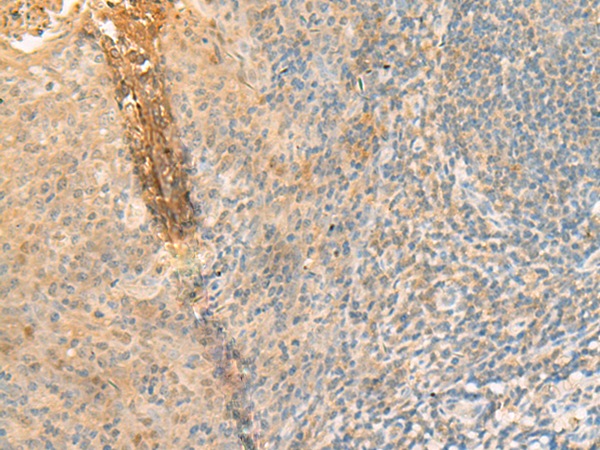
| WB | 咨询技术 | Human,Mouse,Rat |
| IF | 咨询技术 | Human,Mouse,Rat |
| IHC | 1/25-1/100 | Human,Mouse,Rat |
| ICC | 技术咨询 | Human,Mouse,Rat |
| FCM | 咨询技术 | Human,Mouse,Rat |
| Elisa | 1/5000-1/10000 | Human,Mouse,Rat |
| Aliases | ALT2; GPT 2; MRT49 |
| Host/Isotype | Rabbit IgG |
| Antibody Type | Primary antibody |
| Storage | Store at 4°C short term. Aliquot and store at -20°C long term. Avoid freeze/thaw cycles. |
| Species Reactivity | Human, Mouse |
| Immunogen | Synthetic peptide of human GPT2 |
| Formulation | Purified antibody in PBS with 0.05% sodium azide and 50% glycerol. |
+ +
以下是可能与“GPT2抗体”相关的参考文献示例(注:根据上下文推测可能指Glypican-2抗体或其他靶点,建议核实术语准确性):
---
1. **文献名称**:*GPC2-CAR T cells mediate antitumor effects in neuroblastoma*
**作者**:Bosse KR 等
**摘要**:本研究开发了靶向Glypican-2(GPC2.可能缩写为GPT2)的嵌合抗原受体(CAR)T细胞疗法,证明其在神经母细胞瘤模型中可有效抑制肿瘤生长,为儿童实体瘤提供新治疗策略。
2. **文献名称**:*Antibody-drug conjugates targeting Glypican-2 in neuroblastoma*
**作者**:Huang HT 等
**摘要**:报道了一种靶向Glypican-2的抗体药物偶联物(ADC),通过体外和体内实验验证其对高表达GPC2的神经母细胞瘤细胞具有选择性杀伤作用。
3. **文献名称**:*A systematic survey of human cell-surface glycoproteins reveals potential therapeutic targets in cancer*
**作者**:Havugimana PC 等
**摘要**:系统性分析了细胞表面糖蛋白(含Glypican家族),提出GPC2等蛋白可作为抗体靶点,并探讨其在癌症诊断和治疗中的应用潜力。
---
**注意**:若“GPT2”指其他生物学概念(如谷丙转氨酶2或模型名称),建议提供更多背景信息以精确检索。
The GPT-2 antibody is a research tool developed to detect and study the GPT-2 protein, also known as alanine aminotransferase 2 (ALT2), which plays a role in amino acid metabolism by catalyzing the conversion of alanine and α-ketoglutarate to pyruvate and glutamate. This mitochondrial enzyme is expressed in various tissues, including the liver, kidney, and muscle, and has been implicated in metabolic disorders, liver diseases, and cancer progression.
The development of GPT-2 antibodies emerged from the need to investigate its tissue-specific expression, subcellular localization, and functional mechanisms. These antibodies, typically monoclonal or polyclonal, are validated for applications such as Western blotting, immunohistochemistry, and immunofluorescence. Researchers use them to explore GPT-2's role in gluconeogenesis, nitrogen metabolism, and its potential as a biomarker for conditions like non-alcoholic fatty liver disease (NAFLD) or hepatocellular carcinoma.
Interest in GPT-2 antibodies grew alongside studies highlighting metabolic reprogramming in cancer cells, where altered GPT-2 activity may support tumor growth. Challenges include ensuring antibody specificity due to structural similarities with the cytosolic isoform GPT1 (ALT1). Ongoing research aims to refine detection methods and expand clinical correlations, positioning GPT-2 antibodies as critical tools for both basic science and translational studies in metabolism and disease pathology.
×